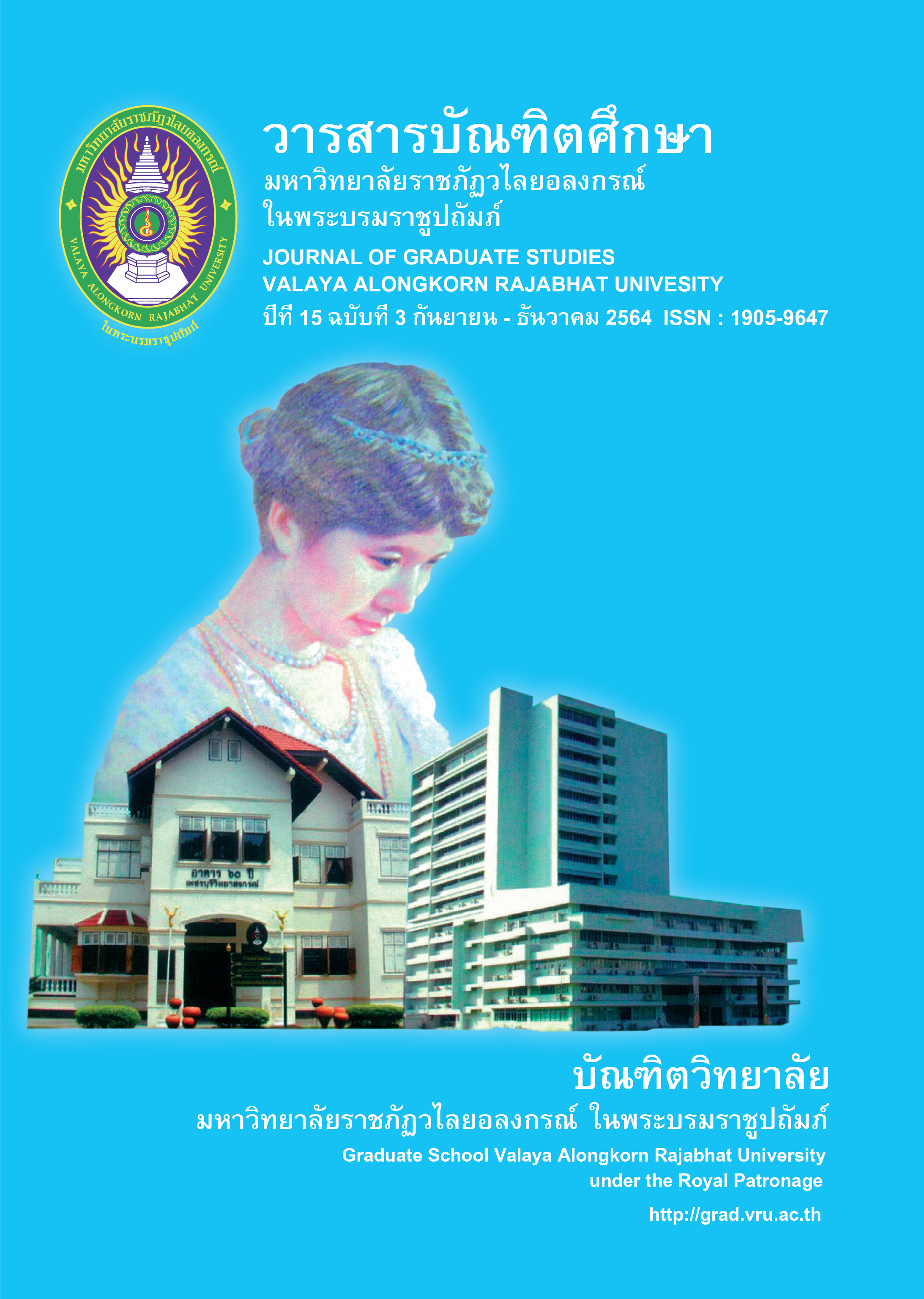A MODEL OF EMBEDDED TECHNOLOGY APPLICATION FOR DEVELOPING STEM COMPUTER PROJECT
Main Article Content
Abstract
The objectives of this research are 1) to establish the development A Model of Applied Embedded Technology for Developing STEM Computer Project. through EDFR technique, 2) to develop the Applied Embedded Technology for Developing STEM Computer Project handbook, and 3) to examine to effect of Applied Embedded Technology for Developing STEM Computer Project handbook. The target group of the development A Model of Applied Embedded Technology for Developing STEM Computer Project. Through EDFR technique were 21 professionals. The target group of using handbook were 30 Mattayom 3 junior high school students from school in Saknonakorn Primary Educational Service Area Office 2, 10 instructors and trainers. Research tools were 1) three EDFR questionnaires, 2) The Applied Embedded Technology for Developing STEM Computer Project handbook, 3) Suitability Assessment Form of the Applied Embedded Technology for Developing STEM Computer Project handbooks. The statistic used for data analysis were a percentage, standard deviation, mode, range of quartile, and t-test dependent.
Research results revealed that 1) A Model of Applied Embedded Technology for Developing STEM Computer Project consisted of 3 components including (1) policies of educational management, (2) Activities of STEM Computer Project, and (3) Indicators of Activities of STEM Computer Project. 2) The Applied Embedded Technology for Developing STEM Computer Project handbook for instructors and trainers and for the students. The overall reflective evaluation of the the Applied Embedded Technology for Developing STEM Computer Project handbook by experts is highest level. 3) The result of using Applied Embedded Technology for Developing STEM Computer Project handbooks on students learning achievement showed post-test scores significantly higher than those pre-test at the 0.01 level of significance. The learning outcomes based on STEM education management was in high level.
Article Details

This work is licensed under a Creative Commons Attribution-NonCommercial-NoDerivatives 4.0 International License.
บทความทุกเรื่องได้รับการตรวจความถูกต้องทางวิชาการโดยผู้ทรงคุณวุฒิ ทรรศนะและข้อคิดเห็นในบทความ Journal of Global of Perspectives in Humanities and Social Sciences (J-GPHSS) มิใช่เป็นทรรศนะและความคิดของผู้จัดทำจึงมิใช่ความรับผิดชอบของบัณฑิตวิทยาลัย มหาวิทยาลัยราชภัฏวไลยอลงกรณ์ ในพระบรมราชูปถัมภ์ กองบรรณาธิการไม่สงวนสิทธิ์การคัดลอก แต่ให้อ้างอิงแหล่งที่มา
References
Arsasuek, S. (2017). kān songsœ̄m nak pradit run yao dūai kitčhakam kānrīanrū tām rūpbǣp khō̜ng sa tem sưksā phư̄a phatthanā phon samrit thāngkān rīan læ čhētakhati tō̜ witthayāsāt khō̜ng nakrīan nai chan rīan witthayāsāt chan matthayommasưksā pī thī sām [The encouragement of students' learning achievements and their attitudes towards science through the stem education instructional method in science class at the 9th grade level]. Master’s thesis. Rajabhat Maha Sarakham University.
Chaipila, D. & Chanunan, S. (2016). phonkān čhat kitčhakam kānrīanrū bǣp khrōng ngān tām nǣokhit STEM Education phư̄a songsœ̄m khwāmsāmāt nai kān kǣ panhā yāng sāngsan thāng witthayāsāt rư̄ang patikiriyā khēmī khō̜ng nakrīan chan matthayommasưksā pī thī sō̜ng [Effects of project-based learning activities based on stemeducation to promote Mathayomsuksa II students' creative problem solving ability in learning chemical reaction]. Journal of education, Burapha University. 27(2), 98-109
Homkrailach, H. (2019). kānphatthanā naksưksā radap parinyā trī phư̄a trīam khwām phrō̜m dān thek satātʻap dōi chai theknik ʻīdī ʻēpʻā [Undergraduate Student Development in Preparation for Tech Startup by Using EDFR Technqiue]. Doctoral dissertation. Rajabhat Maha Sarakham University.
Jaikham, K., & Keawkan, W. (2011). thaksa hǣng ʻanākhot mai kānsưksā phư̄a satawat thī yīsipʻet [21st Century Skills: Rethinking How Students Learn]. The Far Eastern University Academic Journals. 6(2), 99-101. Retrieved from http://journal.feu.ac.th
Khunchompu, S. (2018). rūpbǣp kānčhatkān theknōlōyī sārasonthēt phư̄a songsœ̄m kānthō̜ngthīeo chœ̄ng watthanatham bǣp mī sūan rūam [A Management Model of Information Technology for Cooperative Cultural Tourism Promotion]. Doctoral dissertation. Rajabhat Maha Sarakham University.
Klintawon, S. (2015). rūpbǣp kānphatthanā thaksa kānʻō̜kbǣp khantō̜n withī thāng khō̜mphiutœ̄ dūai withī panhā pen thān dōi chai theknōlōyī wep sō̜ng. sū læ theknik phīlīang [A model of skill development of a computer algorithm, using a web technology 2.0 with a mentoring technique]. Doctoral dissertation. Rajabhat Maha Sarakham University.
Ministry of Education. (2008). Laksūt kǣn klāng kānsưksānaphư̄n thān Phutthasakkarāt sō̜ngphanhārō̜ihāsipʻet [The basic education core curriculum year 2008]. Bangkok: The Agricultural Co-operative Federation of Thailand., LTD.
National Science and Technology Development Agency. (2016). čhotmāi khāo สวทช. chō̜ . sipsō̜ng [Newsletter of National Science and Technology Development Agency F12]. Retrieved from https://www.nstda.or.th/all-newsletter/282-newsletter-nstda-news/21903-nstda-newsletter-12-news5
Pudcha, W. & Yooyuanyong, S. (2016). phon samrit thāngkān rīan čhāk kānčhatkān rīanrū bǣp sa tem sưksā rư̄ang ʻattrāsūantrīkō Na miti [Learning Achievement on Trigonometry Ratios by using STEM Education]. Veridian E-Journal, Silpakorn University. 9(3), 830-839.
Salaksilp, S. (2019). kānphatthanā khūmư̄ kānpramœ̄n kān patibat thī dī samrap chumchon kānrīanrū thāng wichāchīp khrū ʻō̜nlai dōi chai theknik EDFR [Developing a Handbook of Good Practice Evaluation for Online Learning Community of Teaching Professional by EDFR Technique]. Doctoral dissertation. Rajabhat Maha Sarakham University.
Sena Pa, R. & Samang, R. (2016). phonkān čhatkān rīanrū bǣp khrōng ngān pen thān thī mī tō̜ thaksa kānrīanrū khan phư̄nthān nai satawat thī yīsipʻet rāiwichā fisik rư̄ang ngān læ phalangngān samrap nakrīan chan matthayommasưksā pī thī hā [The Effects of Project Based Learning on Learning of Basic Skills in the 21st Century Based on Physics of Work and Energy for Mathayomsuksa 5 students]. kān prachum sammanā wichākān læ nam sanœ̄ phonlakā rawi čhai radap chāt khrư̄akhāi bandit sưksā mahāwitthayālai rātchaphat phāk nư̄a khrang thī siphok ngānwičhai phư̄a phatthanā thō̜ngthin [Conferences, seminars and national research presentations Graduate Network Northern Rajabhat University No. 16 "Research For local development "]. (pp. 324-343). Phetchabun: Research and Development Institute Phetchabun Rajabhat University.
Thettum, T. (2016). kānprīapthīap phon samrit kānrīanrū rư̄ang kān rabāisī nam dūai rūpbǣp kānsō̜n bǣp khrōng ngān [A Comparison of Achievement in Watercolor Painting by Using the Project Based Teaching Model]. Master’s thesis. Srinakharinwirot University.
Thienthong, M. (2011). sathiti læ withīkān wičhai thāng theknōlōyī sārasonthēt [Statistics and research methods in information technology]. Bangkok: King Mongkut's University of Technology North Bangkok.


